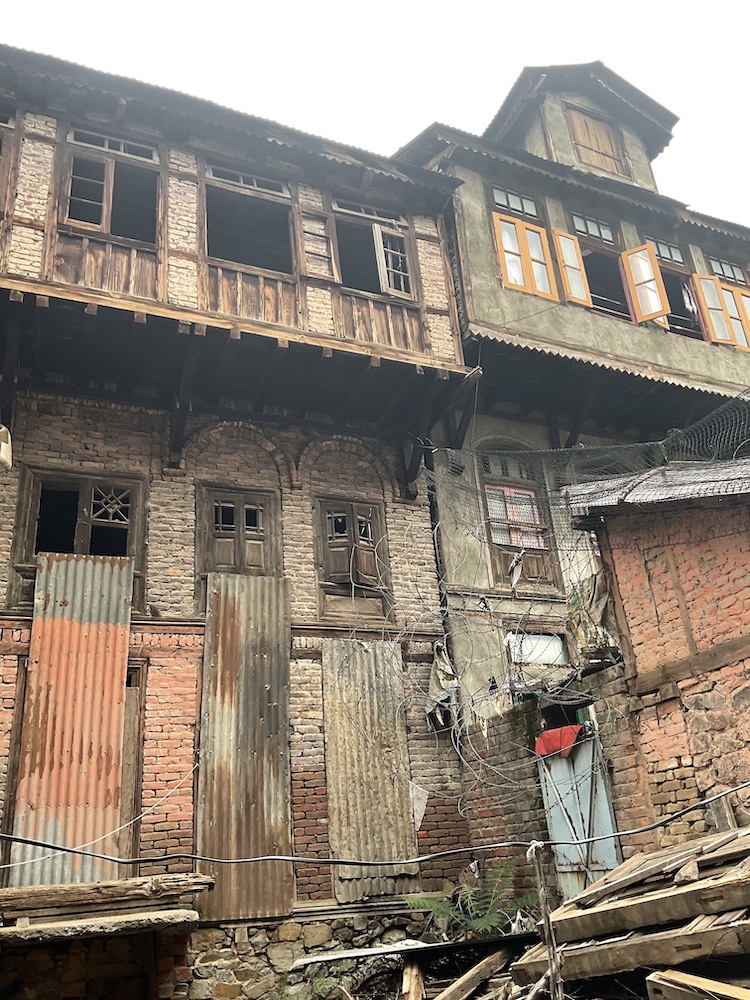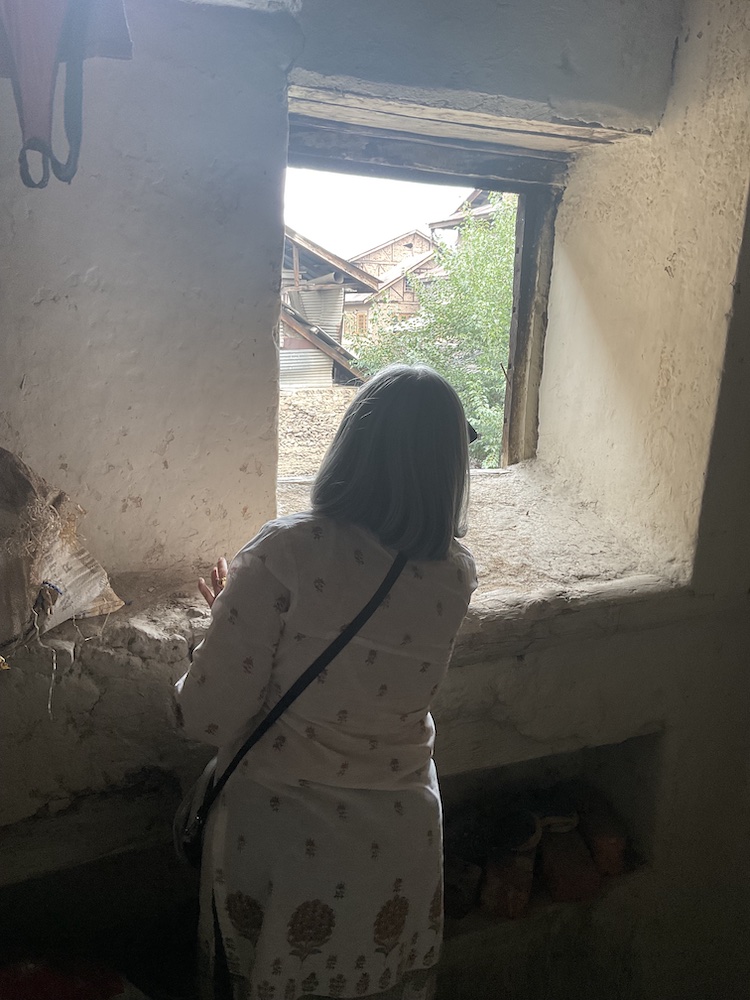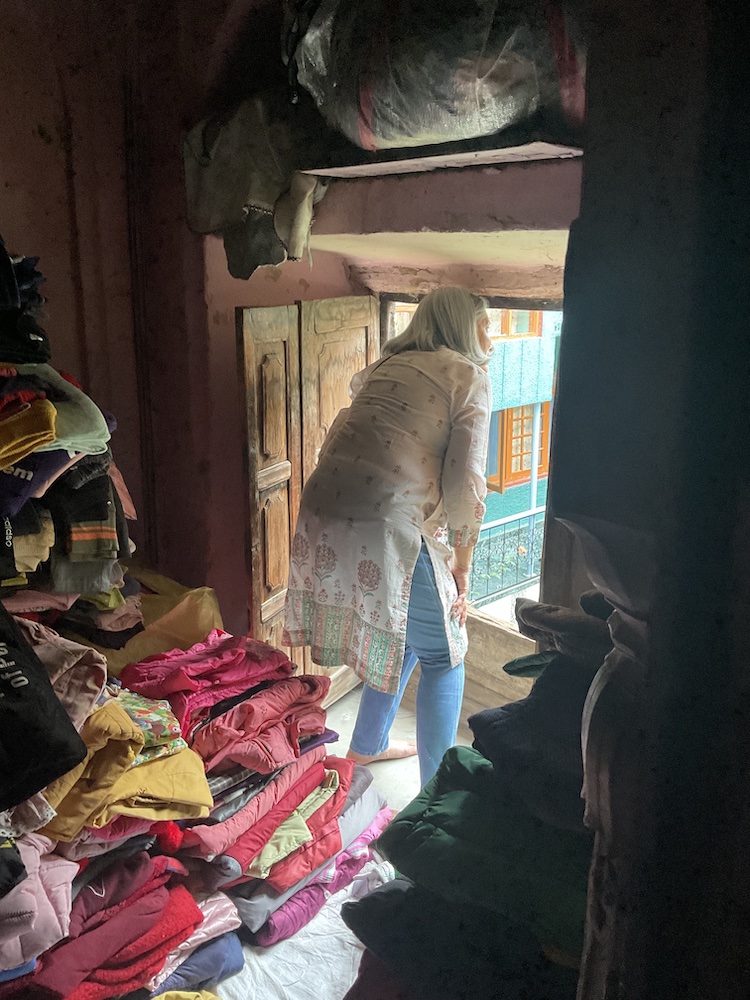As the plane landed in Srinagar, my fellow passengers craned their necks to see the snow-clad mountains that wrapped around the city. I sat still, contemplating and planning the next few days of my trip. I was coming back to my ancestral home and the city of my birth after forty-eight years, but not as a tourist. My only agenda was to visit downtown Srinagar and locate the house that my mother and uncle grew up in. Then, I planned to walk the mile or so to my father’s house, the house where I was born. I had spent the last four years translating the short stories of my uncle Hari Krishna Kaul from the Kashmiri into English. In the process, I had reacquainted myself, albeit from a distance, with Srinagar and my mother tongue, Kashmiri. I now had a personal pilgrimage to make before the book was published. It was a journey I had undertaken many times until I turned twenty and even more times later in my imagination.
Although I knew the physical address—99/1 Zainder Mohalla—I expected the first house would be hard to find. The house number only existed in official records and on an old ration card that had not been used in thirty years. In the past, mail addressed to my grandfather or uncle had not required an exact address. The postman knew where to deliver it. Now, more than three decades after their sudden departures as a part of the Hindu exodus from the city in the winter of 1989, I doubted that the names would mean anything to anyone. I had been told that my uncle’s house had escaped the fate of most Hindu homes; it had not been burned down. I had a good sense of where to begin; the local temple was going to be my North Star. Each Hindu locality in Srinagar had its own temple, and though initially vandalized, the buildings were now being restored. I knew if I found the temple, I could count the narrow lanes on the river side of the main street and locate the one I was looking for.
I drove down to Zainder Mohalla, accompanied by two friends who, though locals, did not know the downtown area at all. I stepped out of the car into the main road, surprised by how little had changed, even after forty-eight years. True, I couldn’t identify any of the shops or houses, but the architecture, the ambience of the place were not unfamiliar. Where we stood, the main street had not been widened. Its bends and turns and the many alleys that snaked away from it, toward the river on one side and to the interior city on the other, were just as I remembered. My friends asked for directions; I just stood, absorbing the sounds and sights, taking everything in. Did the place feel familiar because I have a photographic memory? Or because I was hearing the sounds of my mother tongue all around me? Or perhaps because I had immersed myself in Kaul’s stories these last four years? After all, this was his terrain. It was both his home and the setting of many of the stories.
The temple was not hard to find; the locals knew it well. Like all temples in Srinagar, it was heavily fortified and under the supervision of the Indian army. The army men, sitting high in their bunkers, registered our names and allowed us to go through. A narrow entryway gave way to a large courtyard surrounded by empty houses. Each house had belonged to a Hindu family and was now abandoned. The houses were clustered together in that eerily silent courtyard. Wooden shutters, barely on their hinges, creaking like old bones; small balconies with slats missing through which I glimpsed unlit interiors. Some army men had taken over the ground floors and their laundry was hanging from the lower windowsills. The shutters of the upper-floor windows were wide open. The glass panes had fallen off a while ago and the effect was one of hollowed-out eye sockets. The temple priest, a youngish man, recited the names of the “owners” of the houses. I recognized many, but others had fallen through the pages of recent history.

Hollowed-out houses. Photo credit: Tanveer Ajsi.
Over the years, I had seen countless photographs of such abandoned homes. Seeing them in person, vacant and dilapidated, an overwhelming sense of sorrow enveloped me. Generations of families like mine had lived in these homes and they were all gone one fine day. It was a scene of ruin and desolation, and a stark reminder of the events that had marked the departure of Hindus from the locality and the city. Kaul, I reminded myself as I walked back to the main road, was also one of the many who had had to leave under cover of darkness. Not only did he lose his home and his livelihood but he lost the audience for his plays and his stories too. For a writer there could be no greater misfortune.
Back on the main road, still reeling from what I had witnessed, I started counting the alleys. The third and fourth ones, which we turned into, were not the right ones. Was my memory wrong? After all, forty-eight years is a lifetime. Dejected, I almost walked past the next one. One of my companions turned into the narrow corridor-like space and asked me to take a look. The length and width of the alley seemed right. Unlike the others, it did not go straight down to the river but came to a dead end with a big, black metal door hiding what was beyond. I quickened my pace. The gate in my memory was an old wooden one, but it would have been exactly where this one was. We unlatched it. I stepped over the bar, turned my head to the left and stepped back in quiet shock.
The house I was staring at was exactly as I remembered it. Structurally, nothing had changed. The exterior had been whitewashed and painted, everything else was untouched. It soon became clear why this was the case. This house and the one it shared the courtyard with had been bought by the same family. They had renovated the other house and used this one as a warehouse for their business of recycled clothing. I don’t know what it was about my demeanor that gave me away, but the owners knew immediately why I was there. A middle-aged woman and her daughter stepped out into the courtyard and welcomed me warmly. I explained the reason for my visit and how I had spent many childhood summers in the house. The conversation turned to how they had acquired the properties in 1999. How my uncle’s house survived an attempt to burn it down and how every possession had been looted and the house empty when they acquired it. Furniture, rugs, clothes, pots and pans, and all the books, papers, and pictures had been taken or destroyed. I assumed my uncle’s manuscripts would have vanished as well. The only thing that survived was a massive steel wardrobe on the top floor. Its contents had been emptied but it had proved too bulky to be removed. They described how it was still there, lying on its side, bound by the strong twine that the looters had tried to move it with.
I asked for permission to enter the house, and although it was immediately given, I took my time taking in the exterior and the courtyard. I marveled at the garden they had created. The corn rows and the pomegranate tree added both color and a sense of life to the courtyard. I asked why they had walled up the door to the back alley and they pointed out that they had built another exit nearer to the house. Throughout these conversations I kept looking back at the house. How is it possible that a place you haven’t seen for decades can match your memory when you finally visit it? I gave thanks silently to the “tin roof” that had saved this structure from meeting the same fate as its neighbors. Although not lived in, the house did not have the same hollowed-out look of the houses in the temple courtyard. The ground floor windows were boarded up. The shutters on the third floor were missing, but the whitewash and paint gave the building an oddly spruced-up look.
As I stepped over the threshold to go inside, a million memories jostled for space in my head. How many times had I entered through that low doorway and walked the twenty-odd steps to the kitchen and the sitting room on the right? The rooms were locked but I could see through the walls and remember them as they were in my childhood. The faces of my grandparents, my other uncle, and countless relatives flashed before me as if they had left their reflections behind. I made my way to the staircase. The little built-in shelf at the foot of the stairs, the wider shelf just under the window where the stairs turned were just as I remembered. My younger self had avoided looking at that bigger shelf too closely. This was where I had been told the stern house god lived.

The shelf where the house god lived. Photo credit: Tanveer Ajsi.
“How can a grown man live in that small space?” I remembered asking my grandmother.
“Gods are not like us, they can take any form or shape they want,” she had replied. I had accepted the explanation but always averted my eyes walking past the shelf, even as a young adult.
The window had been boarded up but was now open, and for the first time ever, I allowed myself to linger. I looked out at the blue sky. It was time to put the myth of the house god to rest. Whether he had transferred his loyalties and protection to the new owner or had departed with the old ones was a moot point now.
I continued climbing to the small landing with its two doors to the left and the two doors to the right. I stepped into what had been my grandparents’ room. This one was etched in my memory. A good part of my summer vacations growing up were spent in this room. By day I would read in that middle window seat and at night I would sleep on a thick pile of mattresses next to my mother and grandmother. I walked over to the first window, which my grandfather had appropriated as his own. He spent his mornings there, surrounded by his books, as he wrote letters in the most archaic English to relatives and business associates. In the evening, my cousin and I would sit with him and play a round of rummy. These usually ended with us throwing our cards down and storming away because we would catch the old man cheating. These and other images cascaded through my head as I stood in the room. I looked for the many garish calendar pictures of gods and goddesses that had covered every inch of the walls. I stared out into the courtyard waiting for the long-gone neighbors to make their cameo appearances in their own windowsills. But the walls were bare and the window seats of the surrounding houses were empty. The magnitude of what had vanished overwhelmed me and I sobbed uncontrollably. Was I crying for the dead, or for the living who yearned to come back, or for the little girl whose sanctuary had been violated? I don’t know.
My friends fell silent. Someone asked if I needed a drink of water. The owner gestured for me to go into the smaller anteroom and collect myself. The absurdity of the situation struck me and I stopped crying. The anteroom had functioned as a prayer room for my grandparents. Now it was full of bundles of old clothes. I hesitated, bent down, took my shoes off and climbed over the narrow ledge that separated it from the main room. While I was going through these motions my mind was amazed at my inability, even after four decades, to enter that room with my shoes on. It was no longer sacred, no idols remained, and no prayers had been offered there since that winter of 1989. But to me it would always be the prayer room. I turned to leave and let my fingers drift over the beaten-down wooden door. They caressed every dent and crack and hole in that splintered wood. Were they trying to absorb the stories the door had been witness to? Since the house had not actually been lived in after the sudden departure of my family, it felt as if their memories still lingered. Certainly, unlike many of the other homes, no one had ventured to write over our history.

The former prayer room. Photo credit: Tanveer Ajsi.
My friends and I sat down to tea with the “new” owners. The house had been theirs for over twenty years but I still thought of them as the new owners. Their warmth and hospitality overwhelmed me. I took an instant liking to the young daughter who kept pulling at my shirt sleeve, encouraging me to eat. I was busy talking but her insistent little nudges and pointed glances at the food on my plate got my attention. It was both amusing and touching. Once tea was done, and we declined invitations for lunch, we persuaded the man of the house to accompany us to find my father’s home.
It quickly became clear to me that we didn’t really need a guide. I knew exactly where to turn off from the main road. It was as if my legs knew precisely how long to walk for and then assess where I was. Again, I got us pretty close to where we needed to be. By now I was used to the curious glances I attracted and the occasionally softly murmured “Why don’t you come back” from passersby. The first time it happened I was taken aback. But after encountering this behavior a dozen times from both men and women in that short walk, I appreciated the civility and the instinctive hospitality that it hinted at. How else could one explain the woman in the shop front whom we stopped to talk to? Eager to help, she left her half-eaten lunch, and with her arm held up at a right angle, accompanied us because she was convinced she knew what we were looking for. She didn’t even stop to wash her hand.
We walked past a parking lot. This was where the house should have been. I had been informed that the house was likely to have been demolished. This seemed like the right location, and again, the proximity to the nearest neighborhood temple proved me right. Clearly, other houses alongside ours had been torn down and so most of the markers that I might have responded to were gone. The empty site made little impact on me. It is hard to get emotional about a parking lot. Or perhaps I had wept all my tears in the other house and a certain detachment had crept in. The emotional roller coaster I had been on all day was beginning to take its toll and I needed to spend some time alone. I walked back to the main street in complete silence.
Back in my hotel room, I picked the day apart, minute by minute, scene by scene. I had covered an enormous distance in those four hours of the morning. A barrage of questions and impressions flooded my mind. I would have to wait to comprehend the full impact of my search. At the moment I was grateful for my uncle’s stories and the still-standing house that had allowed me to reclaim some of my childhood. I don’t know if I will come back to Srinagar. Already I have realized that both the city and I are a part of each other’s past, not necessarily the future. The house belonged to someone else. It could be razed tomorrow, next month, or next year. With my anchor gone, how would I feel about the city and the long intervening years? I have built other memories in other places, but perhaps not so evocative as those early ones. At the same time, I know that I have several new recollections to add to the fading palimpsest of this city. The young woman tugging at my shirt sleeve and the woman who followed me for half an hour with her hand held high have staked a new claim in my mind and heart.
The author thanks Tanveer Ajsi and Faiyaz Dilbar for accompanying her to downtown Srinagar. Her cotranslation of Hari Krishna Kaul’s short stories, For Now, It Is Night, is available from Archipelago.
© 2024 by Kalpana Raina. All rights reserved.











